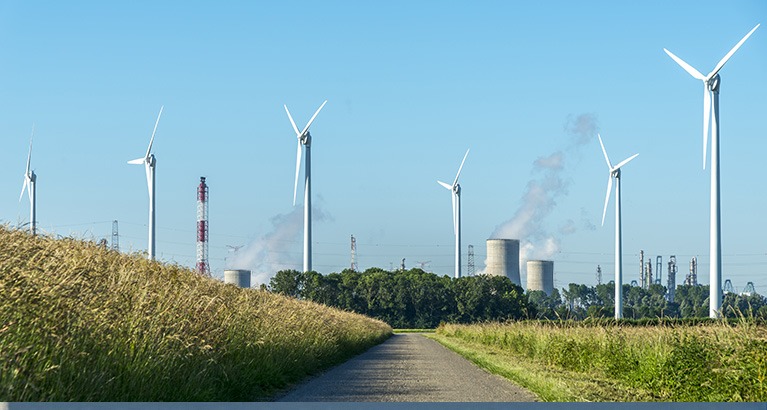The main low-carbon energy sources available in the UK in the battle against climate change are solar, wind, biomass and nuclear energy, but what sorts of people prefer these different options?
That’s the topic of a new study in the December issue of the journal Energy authored at the Energy Policy Research Group at Cambridge Judge Business School, which finds that people’s preferred energy source is related to respondents’ views on the anticipated impact of climate change.
Specifically: people who believe that climate change will be catastrophic tend to prefer renewable energy sources such as solar and wind, while those less concerned about climate change are more favourable towards nuclear power. The study also finds that people prefer energy sources about which they are more knowledgeable or familiar.
3 factors shaping people’s preferred choice of energy
1
Gender
Men are more likely to prefer solar, wind and nuclear energy, while women prefer biomass energy, although the gender effect is, by far, strongest for nuclear power. Women are much less positive about using nuclear power.
2
Education
Individuals with a higher level of scientific education are more likely to prefer solar energy.
3
Politics
Those with more right-wing political orientation tend to prefer biomass and nuclear especially, but there was no relationship found between ideology and wind or solar.
The study – entitled “Determinants of public preferences on low-carbon energy sources: Evidence from the United Kingdom” – was co-authored by Juyong Lee of the Energy Policy Research Group (EPRG) at Cambridge Judge and Changwon National University in Korea, and by David Reiner, Professor of Technology Policy at Cambridge Judge Business School and Assistant Director of EPRG.
The study’s results highlight the importance of adjusting energy transition policies to take into account people’s acceptance of low-carbon energy sources.
Research busts myth older people are less supportive of renewables

“It’s not sufficient to provide a composite view of how the public view low-carbon energy sources,” says co-author Professor David Reiner. “It’s important to consider public awareness and preference of specific energy sources and technologies, particularly among certain demographic groups.
“The challenge of addressing climate change is daunting and will involve every sector and every individual and will likely require every option available. It is also important to clarify certain misperceptions – for example, we do not find that older or more conservative people are any less supportive of renewables such as wind or solar than younger or more liberal individuals. We hope these findings will help inform government policy.”
The study describes how decarbonising the electric power sector is a key first step in achieving the goals of the 2015 Paris Agreement on climate change adopted by196 Parties at the UN Climate Change Conference (COP21). The UK has been a leader in reducing its proportion of coal-generated power generation to single-digit percentages, and the UK’s ambitions have equalled or exceeded the EU’s since Brexit.
We do not find that older or more conservative people are any less supportive of renewables such as wind or solar than younger or more liberal individuals.
Solar and wind energy preferences are driven by risk perception, not trust in government
While some previous studies have shown a strong link between public trust in government policy and public acceptance of low-carbon energy sources, the new study found that only support for biomass energy increases along with public trust in government policy on climate change.
“On the other hand, respondents who prefer solar and wind energy tend to view companies rather than government as playing a more significant role in addressing climate change,” the paper says.
“Thus, public trust in the government’s climate change response policies was not a significant determinant of preferences for any low-carbon energy sources apart from biomass energy. Taken together with these findings, we find public perceptions of potential risks of climate change but not trust in government policy has a significant effect on preferences for solar and wind energy.”
While some studies in other countries have found that younger people prefer renewable energy (as in Finland) or that older people prefer renewable energy (in Australia), the new study found no relationship between energy preference and age or UK region.
Exploring environmental attitudes in the UK: insights from a 2021 YouGov survey
The study’s dataset is based on an online survey of environmental attitudes in the UK conducted in 2021 by pollsters YouGov, based on a representative sample of the UK population. They explored four types of candidate variables: demographic, knowledge, perception, or policy.
The knowledge variable is based on respondents’ background knowledge on how energy is produced, delivered, and used and whether they are familiar with specific energy sources or low-carbon technologies such as carbon capture and storage. The perception variables reflect the priority placed on climate change and whether respondents consider climate change as the most important environmental problem facing the UK. The policy variables include whether respondents are optimistic about the UK government’s environmental and energy policies, and whether they think that low-carbon energy sources should be the top priority in future energy policy.
What insights does the report offer regarding people’s energy source preferences?
Energy transition policies need to align with the factors that influence public acceptance
In conclusion, the authors say the study “demonstrates the need for new approaches and strategies to increase the acceptance of low-carbon energy sources as part of any future energy transition.”
“Given that the government’s low-carbon energy policies and public perceptions of climate change were found to have a significant effect on preferences for low-carbon energy sources, policies for the energy transition need to be adjusted to better reflect what drives public acceptance. Thus, it is necessary to consider energy transition-related policies alongside public information campaigns and programmes aimed at wider public education.
“Apart from incentives for low-carbon electricity, it is also necessary to identify ways to secure policy support considering the characteristics of each energy source and expand public awareness of climate change and individual technologies.”
Apart from incentives for low-carbon electricity, it is also necessary to identify ways to secure policy support considering the characteristics of each energy source and expand public awareness of climate change and individual technologies.
Further research from Professor David Reiner on low carbon energy and technologies
A brief summary of other pieces of recent research by David Reiner relating to low-carbon energy sources and technologies.
Most climate change mitigation scenarios restricting global warming to 1.5 °C rely heavily on negative emissions technologies and practices (NETP). So this study identifies the most appealing such technologies, evaluating 36 configurations considering their technical maturity, economic feasibility, greenhouse gas removal potential, resource use, and environmental impacts.
Although no single NETP is superior to the others in terms of all the indicators simultaneously, the study identifies 6 deemed particularly promising forestation, soil carbon sequestration, enhanced weathering with olivine and three modalities of direct air carbon capture and storage.
View paper "Sustainable scale-up of negative emissions technologies and practices: where to focus"
The concept of removing greenhouse gases (particularly CO2) from the atmosphere has been gaining increasing attention in recent years, but removing CO2 is a “much more established concept than one might think”. The precursors to what is today referred to as “enhanced weathering” have been actively discussed since the mid-1990s, while the potential for including negative emissions as part of an emissions trading scheme was first suggested over 20 years ago – but there has been little practical, legislative, or regulatory progress to date. So the study suggests five key steps to establish a framework for such removal, including development of an internationally agreed-upon approach for calculating the carbon removal efficiency of a given carbon removal project.
View paper "Comparing approaches for carbon dioxide removal"
While weather factors have been used for grid-level electricity demand estimations, the impact of different weather conditions on individual households has not been fully addressed. So the deployment of smart meters enabled this study to analyse weather effects in different periods of the day using hourly panel datasets. The findings: “We demonstrate that temperature has robust and relatively flat effects on electricity demand across all periods, whereas rain and sunshine duration show greater potential to affect individual behaviour and daily routines”. The authors say the methodology could help improve understanding behavioural response in household energy consumption.
This study evaluates the influence of democracy on clean energy transition by studying national solar, wind, hydro and nuclear energy shares of total energy use for electricity generation from 1980 to 2020. Using data from various agencies including the World Bank and Freedom House, the findings suggest that even after controlling for country-level drivers of energy portfolios, democracy has a significant effect on low-carbon energy sources. “Strikingly, democratic spells (of increased democratic institutions and processes) in advanced economies tend to inhibit solar, wind and hydro energy, but promote nuclear energy use, while, in contrast, having the opposite effects (promoting solar, wind and hydro and inhibiting nuclear shares) in developing countries”.
Featured research
Lee, J. and Reiner, D. M. (2023) “Determinants of public preferences on low-carbon energy sources: Evidence from the United Kingdom” Energy





